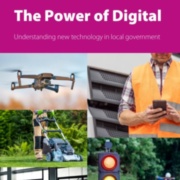Funding and digital skills shortage identified as the most common barriers to local authority technological adaptation
The report, a collaboration between the Association for Public Service Excellence (APSE) and Society for Innovation, Technology and Modernisation (Socitm), makes five recommendations on how local council frontline services can benefit from better adoption and use of digital, data and technological capabilities to improve outcomes for people and communities in places.
Supported by data captured via an online survey and roundtable discussions involving UK local authorities, key findings from the report include:
- 83% of those surveyed consider “Funding” to be a barrier to improving digital/new technology capacity, with 61% identifying “Lack of skills” as a barrier.
- Over two-thirds of those surveyed think the technology works “Good/OK” for their frontline service. Just 1% believe it hinders service delivery.
- Around half of those surveyed (46%) identified “Misinformation” as the most common cyber risk.
- 85% of those surveyed agreed or agreed somewhat with the statement that “Some of our traditional workers have struggled to adapt.”
Informed by these findings, APSE and Socitm have made the following five recommendations:
- Leadership teams in local government should seek to embed a culture of embracing new technologies, skills and capabilities to support service improvements.
- For the use of new technology to be embraced by workers, it needs to be viewed through the prism of support and improvement, rather than a threat to jobs.
- Digital solutions should always be inclusive and enhance accessibility, they also need to be tested to ensure people at a local level are not excluded from service access.
- Investment in digital, data and technological solutions should not be viewed as a drain on resources but a means to future-proof services, generate improvements in productivity and service standards, and enhance the customer experience.
- Local councils should use networks within APSE and Socitm to share best practice. They should also engage with suppliers so that new technologies can be tested and refined before large investments are made.
Complete with best practice examples from local councils across the UK, the report also includes an easy-to-use IT terminology glossary.
Speaking about the research, Nadira Hussain, Socitm Chief Executive, said:
“Local councils are often wrongly accused of being too slow to adapt to technological change. The findings from this report paint a very different and encouraging picture. From predictive technology identifying mould in social housing to drones delivering infant school meals, the research reveals a dynamic sector transforming frontline service delivery, securing greater efficiencies and cost savings, as well as providing better customer service for local communities. We need to capitalise on the exemplary cases of innovation across the sector and help mainstream its adoption. Socitm and APSE are optimistic that this comprehensive resource will offer practical and timely guidance, as well as insight to enable colleagues across the sector to review and rethink local public service transformation.”
Mo Baines, APSE Chief Executive, added:
“The current financial position of many councils places them at risk of missing invest-to-save opportunities in the digital sphere. Therefore, this research makes a number of recommendations which we hope will inform local council frontline services as to how to benefit from the better adoption and use of digital, data and technological capabilities to help improve outcomes for local people and local places. Crucially, we call upon councils to ensure that any advances in the digitalisation of service is inclusive of all within our communities. This should go beyond the public sector equalities duty with a recognition that digitalisation can in fact improve access to public services if done in the right way."
The report is available to download from the APSE website here.
-END-
Notes to editors:
About APSE
APSE is a not-for-profit organisation working with over 300 local councils throughout the UK. APSE campaigns for support to local authority frontline services and for fair funding to local
Socitm
Socitm is a professional network for 2500+ digital leaders involved in the transformation of local, regional and national public services. www.socitm.net
About the research
This research was conducted by: Matt Ellis, APSE Principal Advisor: David Ogden, Engagement Director, Socitm; Samantha Smith, Director of Institute, Socitm; with support from George Barton, APSE Communications Officer; and Alexandra Murphy, Marketing and Communications Assistant, Socitm.
The research was co-commissioned by Mo Baines, APSE Chief Executive and Nadira Hussain, Chief Executive Officer, Socitm, as a collaborative and co-produced research paper reflecting the organisational priorities of APSE and Socitm members.


.png)



.png)